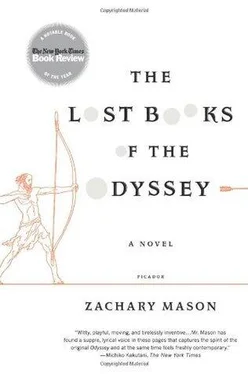In that moment the Minotaur woke and swatted him away with a massive paw. Theseus recovered and sprang to his feet as the Minotaur bellowed and charged with lowered horns. Theseus feinted left and stepped right, as he had practiced so many times with his father’s bulls in Athens, and as the beast went roaring by he cut through its spine at the base of its neck. The Minotaur slowed, then teetered and fell heavily, comically, landing on its stomach with a loud slap. A blood bubble formed on its nostril, burst, and then stillness. Dead, the monster was pitiful, its glazed cow eyes full of terror. Theseus ineffectually tried to clean his sword on the walls (he did not want to sully his shirt and could not bear to approach the corpse), regarded his fallen enemy for a moment, and turned to trace his way back out of the labyrinth. It occurred to him to gather up the twine but it would have been hard to re-roll and anyway he thought, “Let them see the artifice by which their god was killed by Theseus the Athenian.”
Outside the labyrinth Ariadne was waiting for him. Her cheeks were tear-stained but she greeted him with composure. They plucked the other Athenians out of their cells and stole away to the docks where they waved torches in the damp night air and their ship, which had been cruising outside the harbor every night, came in to fetch them. Once they were well out to sea they stopped creeping around the deck and speaking in whispers and started laughing, shaking their fists at King Minos and the city whose tutelary demigod Theseus had just butchered. Now and then they fell silent and there were no sounds but the rippling of the sails and the murmur of the bow wave. After a while someone would say, “Steak, anyone?” and the laughter would begin again. Ariadne did not participate, but Theseus held her hand and kissed her and told her how beautiful Athens was.
When they arrived, King Aegeus embraced Theseus and welcomed Ariadne with the courtesy due a princess and the warmth due a daughter. She and Theseus were married on the Acropolis under a hunter’s moon while the people waved torches and sang. Their first son was conceived that night and not long after old Aegeus privately told Theseus that he was replete with honor and intended to abdicate so that he, Theseus, could enjoy the kingship while he was young. One son was born and then another and Theseus settled into maturity, the wise king of a prosperous people.
One summer many years later, when Ariadne’s golden hair was turning silver, Theseus returned from a hunt and realized that it was the day the sacrifices would have gone to Crete. He thought of his fight with the Minotaur, and on a nostalgic impulse went down into the cellars beneath the castle to look for Ariadne’s sword. The cellars, excavated centuries before as a refuge against invaders, were dim, extensive and confusing. He lost his way but kept walking through the low corridors, taking turns at random, sure he would soon find his bearings. In this he was proved correct when he turned a corner and came upon a length of twine laid along the floor, disappearing down the hall in both directions. Beside it lay the sword he had been looking for. He picked up the blade, chose a direction and wonderingly followed the twine until he emerged from the labyrinth in Knossos to find Ariadne there waiting for him, golden-haired, a girl, calm and composed, her cheeks wet with tears.
Once again he went through the motions of escape but this time his heart was not in it. He distrusted Ariadne, thinking she must be in league with Daedalus and Minos, trying to break him with her sorcery, tricking him into a labyrinth without boundaries. On the boat she went to him for comfort, but he was cold to her and she soon went off to sit by herself — the other Athenians took Theseus’s cue and ignored her. Theseus watched her with hard eyes and the next day announced that he needed to unship ballast and ordered the ship to Naxos. He did not force her from the ship at sword’s point, but said he would do so if he had to, even though the only sword he had was the one she had given him and thus probably cursed. She wailed and tried to cling to him but his face did not change as he flicked her tears from his hands and at last she allowed herself to be lowered into the shallows, racked by sobs. He made sail as she waded ashore through the breakers. Later, he thought she must have cursed him and made him forgetful, she who was a priestess and had the ear of spirits, because in his self-absorption he forgot to hoist the white sails and in the moment of his return became a patricide. *
Once the ship was out of sight, Ariadne gave herself over to hysterical weeping and hatred for the man for whom she had betrayed her family and her kingdom. When she had recovered herself enough to breathe and walk again, she climbed to the peak of Naxos’s single mountain and made herself a bower in the woods. From time to time a ship would stop to take on water, sometimes even one belonging to her father, but she considered all ties cut and hid until they left. She practiced the black arts in which she had been instructed since she was a little girl and as years passed turned witchy and potent. Rumors spread of a white nymph haunting Naxos, as beautiful as she was fell and wholly without pity.
She had been lonely for so long she could not conceive of its absence when the stranger washed up on her shore. His lips were blue and his hair matted and tangled with seaweed but in her eyes he was beautiful. She wondered if the half-drowned man would relieve her solitude but she concealed her need even as she nursed him. When he woke she said her name was Concealer *and that he was lucky to be alive. He made all the necessary noises of gratitude but within minutes betrayed her, telling some tale of a distant war and a longed-for home, a son and even a wife awaiting his return. This was painful, but she had learned patience. She gave him the run of the island and said he should go home if he could, she had done all that was in her power to do. He spent his days on the beaches in hopes of seeing a ship but the white fog she had summoned hid everything. On the fourth night she was not surprised, and thus easily able to conceal her delight, when he came to her bed.
As for Theseus, he is in Hell now, wandering and restless, but he is the happiest of shades, always expecting to find himself once again among the blank white halls, the arcades and the high galleries.
*Pasiphaë was Minos’s wife. She had offended the goddess Hera, who punished her with a great passion for a sacred white bull. Daedalus built a sort of hollow cow simulacrum for her, with which she was able to consummate her desire. The issue of that union was the Minotaur, a cannibalistic monster half man and half bull.
*A reference to Argos, a thousand-eyed giant employed by Hera as the guardian of a grove of golden apples. His eyes slept independently — no matter the time of day or night, hundreds would be awake and looking in any given direction.
*Aegeus, his father, had told the ship’s crew to hoist white sails if Theseus lived and black if he had perished. When he saw his son’s black-sailed ship sailing toward Athens he flung himself from the Acropolis in despair.
*The Greek word for concealer is Calypso .
His days were bound by the disc of ocean. In the morning he climbed to the top of her island and sat clutching his knees to his chest against the wind, scanning the horizon for white sails. She left him alone while the sun shone but at dusk she approached out of the gloom, touched his face, took his hand and made to draw him back toward her cave. He pushed her roughly away. “Stay, then,” she said, “and look for ships in the dark.” He stiffened and turned his back. Her face fell and she said she was sorry, she had not meant it, but there was not much good in keeping watch at night. Carefully nursing his pride, she drew him back to her bed.
Читать дальше












